| Introduction |
I’m writing this introduction from Ethiopia where Esther Ronner and I have been discussing N2Africa activities for this year with many partners in Bahir Dar, Debre Zeit and Addis Ababa. We have a ‘bridging grant’ from the Bill & Melinda Gates Foundation to get N2Africa up and running in Ethiopia, Tanzania and Uganda. Endalkachew Wolde-Meskel will update you in the next Podcaster about our plans in Ethiopia, but to give a small taster – the Ministry of Agriculture and the Agricultural Transormation Agency have identified Rhizobium inoculant as one of it’s main priority interventions in Integrated Soil Fertility Management and we will be supporting them to achieve their ambitious goals. Read on below to learn of the plans we have developed for the coming season in northern Tanzania and Uganda. ....
|
1 |
| Obituary announcement |
|
The N2Africa family has lost a colleague. Mr. G. Zargba Gaye, a beloved and humble colleague died unexpectedly after a brief illness. This sad event occurred on February 9, 2013 at the St. Joseph Catholic Hospital in Monrovia. |
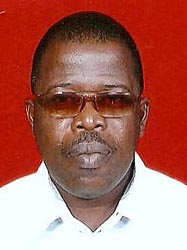
|
|
1 |
| N2Africa Rhizobiology Activities at Kalambo, DR Congo |
|
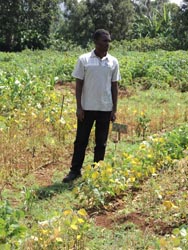
|
The Eastern part of DR Congo, in the Sud Kivu province, is one of the target areas of N2Africa. In DR Congo, N2Africa’s objectives 3 (rhizobiology studies) and 5 (capacity building) are led by Université Catholique de Bukavu (U.C.B.) through the faculty of agriculture, one of the project partners.
The team responsible for Rhizobiology activities at Kalambo (Objective 3) and Capacity building (Objective 5) in DRC, is led by Prof. Walangululu and consists of three trained core members to implement laboratory activities in the framework of objective 3 and one N2Africa core member to lead capacity building of farmers, while Prof. Walangululu leads the degree related training. ...
Photo: Deficiency and/or toxicity: Symptoms on soyabean at Mushinga
|
|
2 |
| N2Africa plans for 2013 |
As Phase 1 of the N2Africa project comes to a close in October this year we have reviewed and agreed on work plans for the remaining period (and of course the finances). The planning of this year’s activities has been guided by what needs to be done to achieve our objectives for delivery and dissemination (D&D). On the other hand we will conduct an ‘early impact assessment’ to evaluate the success and draw lessons on how D&D of legume and BNF technologies can be improved in future. Further, we want to implement a strategy to ensure that the gains we have made in the past years are sustained. ...
|
2 |
| N2Africa-ADVANCE partnership enhances soyabean-rhizobium inoculants technology dissemination – Part 2 |
|
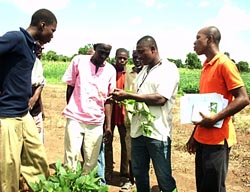
|
Second part of the article about activities in Ghana and the partnership with ADVANCE: This time about training
Photo: Farm Liaison Officer explaining the importance of nodules to the farmers
|
|
3 |
| Soya production: The Mozambique Experience |
|
Contribution describing the background, partnerships and major interventions, perosnal encounter and prospects for Mozambique.
Photo: Members of the Tirimbique Farmers’ Associations on a demo plot at a Tirimbique village in Angonia district, Tete province, Mozambique
|
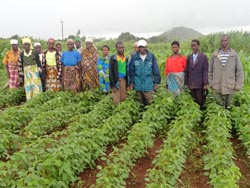 |
|
3 |
| N2 Africa starts activities in Uganda |
A follow-up workshop was conducted at Makerere University on 4th February 2013 to identify partners and to agree on start up activities for the N2Africa Project in Uganda. Participants at the workshop were research and development organizations including the Namulonge Crops Resources Research Institute (NaCCRI) and National Semiarid Agricultural and Animal Research Institute (NaSAARI) of National Agriculture Research Organisation (NARO), International Institute of Tropical Agriculture (IITA), International Centre for Tropical Agriculture (CIAT), International Fertilizer Development Centre (IFDC), Africa 2000 Network Uganda (A2N), VECO East Africa, Soyabean Products International, World Vision Uganda and the Department of Agricultural Production and Soyabean breeding and Seed Systems Project of Makerere University. ...
|
4 |
| Planting time: a crucial management decision for the cultivation of soyabean in the humid tropics |
|
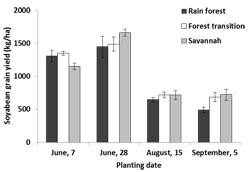
|
In many regions where N2Africa works, farmers need to plant soyabean at the beginning of the growing season in order to have a mature crop by the time the rains cease. The humid tropics covering most of Sierra Leone and Liberia however are blessed with a rainy season of at least 7 months ....
Fig. : Soyabean grain yield as affected by planting time in three agro-ecological zones in Sierra Leone. Average of two varieties (TGx 1448-2E and TGx 1904-6F); error bars indicate standard errors of means
|
|
4 |
| MFAGRO Farmers: A Stronger Voice in Vihiga County, Kenya |
|
The goal of MFAGRO is to bring new technology to its members and the farmers of Vihiga County, Western Kenya. We recognize the N2Africa Program and its partners CIAT, MEA Ltd. and Promasidor for assisting our group toward that end over the past year (2012) and we look forward to working with you during 2013. ...Photo: Farm inputs and soyabean products on display during the Provincial Agricultural Show in Kakamega, Western Kenya (Photo Dick Morgan Ongai)
|
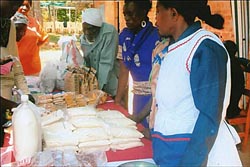 |
|
4 |
| Learning from Farmer Managed Soyabean Trials in Kenya |
 |
Outreach activities continue to test new soyabean varieties, input combinations and cropping arrangements that promote BNF. During the 2012 long rains in west Kenya (March to July), two new soyabean varieties from SeedCo were compared to SB 19 (the current industry standard). ...
Photo: This former tobacco grower in Migori, west Kenya, has shifted to soyabean production using the production package offered by N2Africa (photo credit Moses Chamwada)
|
|
5 |
| N2Africa Planning Workshop - Tanzania, 11-12 February 2011 |
|
A two days’ sensitization workshop was conducted from 11-12/2/2013 at The Nelson Mandela African Institute of science and Technology in – Arusha – Tanzania, to plan for the N2Africa project activities in Northern Tanzania. The workshop was attended by more than 30 participants. ..... |
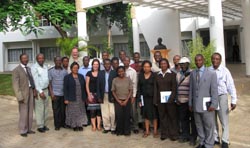 |
|
5 |
| The Crawford Fund Master Class on Rhizobiology |
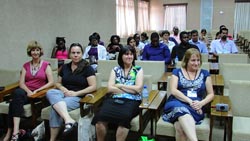 |
The Crawford Fund Master Class was a two-week training course, held from the 1st -13th of December 2012 in the city of Kandy, Sri Lanka on all the skills and techniques of rhizobiology. Participants, facilitators and coordinators were from 10 different countries.
The theme of the master class was "The isolation, identification and utilization of root nodule bacteria (rhizobia) in promoting sustainable agricultural productivity.
|
|
6 |
| Limitations in the Production of Legume crops in Zimbabwe |
|
Legumes, such as groundnuts, sugar beans, soyabeans, cowpeas and bambara nuts, are important in the cropping systems of smallholder farmers in the communal areas in Zimbabwe. These legumes are often referred to as women’s crops and they are not given as much attention as other crops like maize, tobacco and cotton. Despite the fact that legumes enhance soil fertility through biological nitrogen fixation (BNF), their role in human nutrition and their contribution to household cash income are still not highly appreciated. This article seeks to bring out some challenges that limit the production of the legumes by smallholder farmers in Zimbabwe.
Photo: Isaac Chabata pointing out the different treatments in the soyabean D&D trial of Ambrose Mapire, Makoni district.
|
 |
|
6 |
| January 2013 episode of the Bill & Melinda Gates Foundation podcast “Inside the Gates” |
This podcast is designed to provide a glimpse into the Bill & Melinda Gates strategies and the people who work at the foundation, and is part of their ongoing effort to share information with you on a regular basis.
In January’s episode (Episode 5):
-
A conversation with Aliko Dangote. James Whittington reports from Nigeria and sits down with Africa’s wealthiest individual to learn about the part he’s playing to help eradicate polio.
-
The evolution of a partnership. We met with grantee Asia Society and our College Ready education team to hear what they’re learning about working together to help all students succeed in school and life.
-
Around the foundation. Bill’s Annual Letter is coming up and Melinda paid a trip to the BBC as a guest editor. Our roving reporter brings you the highlights.
-
New Year’s Resolutions. Irvin tells listeners what he’s looking forward to in 2013
You can listen it here.
|
8 |
| MSc, BSC, Internship reports freely available on the N2Africa internet |
The MSc, BSc, internship reports of our Wageningen University students are made freely available on our website. You wil find the reports under the tab "outputs". All our work done in Wageningen is done via global access and we are aiming to make it available to everybody.
We have many students still studying at partner universities in Africa and we hope very much that their thesis reports will be made available very soon.
|
16 |
| Links to video on women in extension |
From Agro-Insight we received a link to a video on women in extension. The link is available several languages. Click the language of your choise if you want to watch: English, French, Kiswahili or Portugese.
You can watch online or download the video and audio files for later use.
|
17 |
| Conference announcement |
IFDC offers a training program "Linking Farmers to Markets in Africa" in East Africa. It will be held in Nairobi, Kenya, July 1-5, 2013.
the program is meant for development professionals from both public and private sector with specific interest in farmer-to-market linkages, such as agro-input dealers, importers, traders and trader organizations; producer organizations; and development projects, donors, NGOs and other agricultural development practitioners.
For more information see this link.
|
17 |











